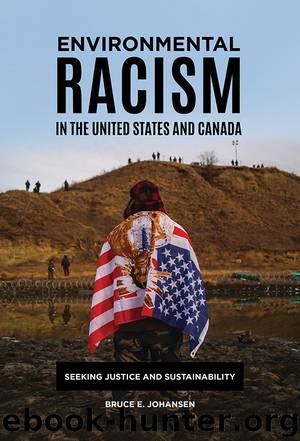Environmental Racism in the United States and Canada by Bruce E. Johansen

Author:Bruce E. Johansen
Language: eng
Format: epub
ISBN: 9781440864032
Publisher: ABC-CLIO
“Blaming the Victims”
The New York Times reported from the scene that Trump’s tone-deafness to massive human suffering had “provoked another wave of criticism from the island and its supporters. They expressed astonishment that Mr. Trump would assail the very people he was supposed to be assisting, in contrast to the tone he has taken with Florida and Texas, where National Guard troops and Federal Emergency Management Agency workers are also still helping with hurricane recovery” (Baker and Dickerson, 2017). Mayor Carmen Yulín Cruz of San Juan said that Trump once again was adding “insult to injury,” as she called upon aid from international organizations to prevent “the genocide that will result from” Trump’s inaction. “Tweet away your hate to mask your administration’s mishandling of this humanitarian crisis,” she said, addressing Trump. “While you are amusing yourself throwing paper towels at us, your compatriots and the world are sending love and help our way. Condemn us to a slow death of non-drinkable water, lack of food, lack of medicine while you keep others eager to help from reaching us” (Baker and Dickerson, 2017).
While Trump took little action, Puerto Rico was suffering one of the worst hurricane-wrought disasters in human history. The New York Times reported: “On a helicopter trip on Thursday morning to Cidra, a small city an hour south of San Juan, the devastated landscape was speckled with homes that were without roofs and covered with tarps. Almost every street was lined with huge piles of tree branches and other debris beginning to rot and stink” (Baker and Dickerson, 2017).
The daily struggle to survive in Puerto Rico was described by Caitlin Dickerson in the Times (2017):
After a day spent working in an office in the dark, without air-conditioning, Iris Díaz arrived at her neighborhood CVS drugstore [in San Juan] desperate for what has quickly become one of the most sought-after items in Puerto Rico: bottled water. A sales clerk standing behind the checkout counter explained that the store had been out of stock for three days. “Ni una sola botellita?” Ms. Díaz pleaded in Spanish. “Not even one little bottle?” The employee shook her head and apologized. . . . Her home was still without electricity or water. She, her husband and their 12-year-old son were growing impatient with having to drink a kind of storm tea—boiled tap water, which she said had turned a yellowish hue after the storm.
Dickerson continued: “People are so desperate . . . [that] the Environmental Protection Agency cited reports of residents trying to obtain drinking water from wells at hazardous Superfund sites. ‘EPA advises against tampering with sealed and locked wells or drinking from these wells, as it may be dangerous to people’s health,’ the agency said. Waterborne diseases were reported to be spreading rapidly in many rural areas where people were subsisting on unfiltered water from rivers and ponds. ‘What happened in Texas and Florida were disasters,’ said W. Craig Fugate, who was FEMA administrator under President Barack Obama. ‘What happened in Puerto Rico was a catastrophe’” (Dickerson, 2017).
Download
This site does not store any files on its server. We only index and link to content provided by other sites. Please contact the content providers to delete copyright contents if any and email us, we'll remove relevant links or contents immediately.
| Arms Control | Diplomacy |
| Security | Trades & Tariffs |
| Treaties | African |
| Asian | Australian & Oceanian |
| Canadian | Caribbean & Latin American |
| European | Middle Eastern |
| Russian & Former Soviet Union |
The Secret History by Donna Tartt(19085)
The Social Justice Warrior Handbook by Lisa De Pasquale(12190)
Thirteen Reasons Why by Jay Asher(8909)
This Is How You Lose Her by Junot Diaz(6885)
Weapons of Math Destruction by Cathy O'Neil(6279)
Zero to One by Peter Thiel(5801)
Beartown by Fredrik Backman(5751)
The Myth of the Strong Leader by Archie Brown(5507)
The Fire Next Time by James Baldwin(5442)
How Democracies Die by Steven Levitsky & Daniel Ziblatt(5218)
Promise Me, Dad by Joe Biden(5153)
Stone's Rules by Roger Stone(5087)
A Higher Loyalty: Truth, Lies, and Leadership by James Comey(4960)
100 Deadly Skills by Clint Emerson(4924)
Rise and Kill First by Ronen Bergman(4788)
Secrecy World by Jake Bernstein(4752)
The David Icke Guide to the Global Conspiracy (and how to end it) by David Icke(4717)
The Farm by Tom Rob Smith(4507)
The Doomsday Machine by Daniel Ellsberg(4490)
